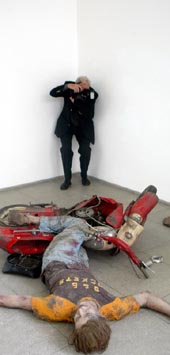 |
| A man takes a picture of the Motorcycle Accident by late US artist Duane Hanson at the Friedrich Christian Flick Collection in Berlin. (Reuters) |
Berlin, Sept. 21 (Reuters): A show of modern art belonging to the millionaire grandson of a convicted Nazi industrialist opened in Berlin today, and stoked a row over whether the owner had done enough to atone for his family history.
Art collector and one-time playboy Friedrich Christian Flick said he must decide for himself how to respond to his family?s past and the responsibility it had given him.
The 60-year-old has come under fire for failing to contribute to compensation funds for forced labourers. His grandfather, also called Friedrich Flick, employed up to 50,000 forced labourers and concentration camp inmates in his coal, steel and armaments factories during World War Two.
?I don?t believe you can inherit guilt. I believe that you can inherit responsibility,? Flick has said previously, adding he has preferred to direct his responsibility to the future.
But the exhibition of Flick?s 2,500-piece collection, on loan to Berlin?s contemporary art museum for seven years, has angered Nazi victim groups and fuelled a debate about how younger generations ought deal with the guilt of their forbears.
The elder Flick supported Hitler financially and profited from the Nazi ?aryanisation? programme which seized businesses from Jewish owners. After World War Two, he was sentenced to seven years in prison at a trial in Nuremberg. He went on to rebuild his business empire and was number five on the world?s list of richest people at his death in 1972.
Michael Teuten of the national information and advice centre for Nazi victims said the decision by Chancellor Gerhard Schroeder to officially open the show sanctioned Flick despite his failure to pay into compensation funds.
Flick said he intended the show at Berlin?s Hamburger Bahnhof to add a brighter chapter to the family?s dark history.
?This is no different from what Germany itself is doing ... it also wants to show a better side after World War Two,? he said.
He financed an eight million euro extension to the Berlin museum after his original plan to build a museum in Switzerland was scrapped due to opposition from Jewish and cultural groups.
The German government and Berlin culture chiefs have defended the exhibition saying it will trigger a broad debate on historical responsibility.
They have also commissioned leading Third Reich historians to study the Flick family's history.
But they also stress the importance of the contemporary art and its importance to Berlin as a cultural centre.










